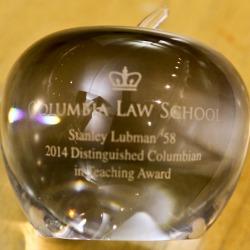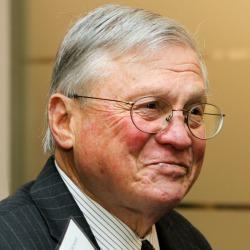Chinese Legal Studies Scholar Stanley Lubman '58 Receives Distinguished Columbian in Teaching Award
New York, January 9, 2014—The Columbia Law School Association presented the annual Distinguished Columbian in Teaching Award to alumnus Stanley Lubman ’58, a pioneer in Chinese legal studies in the United States.
Lubman received the award at a reception in Jerome Greene Hall’s Drapkin Lounge on Jan. 3. Dean David M. Schizer and Benjamin L. Liebman, the Robert L. Lieff Professor of Law and director of the Center for Chinese Legal Studies at Columbia Law School, presided over the ceremony, which drew members of the faculty and dozens of alumni and friends of the Law School—despite the first major winter snowstorm of the New Year. Lubman’s family was also in attendance. The event was held in conjunction with the annual meeting of the Association of American Law Schools.
| Stanley Lubman '58 received the Distinguished Columbian in Teaching Award on Jan. 3. |
Lubman, who holds an LL.B., LL.M., and J.S.D. from the Law School, is a senior fellow at The Honorable G. William and Ariadna Miller Institute for Global Challenges and the Law and a distinguished lecturer in residence at UC Berkeley School of Law. He has specialized in China as a scholar and as a practicing lawyer for more than 50 years. He began his teaching career with a seven-year stint at Berkeley starting in 1967. He then taught at Stanford, Yale, Columbia, Harvard, the University of Heidelberg, and the School of Oriental and African Studies at the University of London before returning to Berkeley in 2002.
In 2005, Columbia Law School honored Lubman by holding a conference in his honor that drew more than 60 scholars of Chinese law from North America, Europe, and China. The resulting papers were published in a special issue of the Columbia Journal of Asian Law.
From 1972 to 1997, Lubman advised American, European, and Japanese clients on the People's Republic of China, and he also represented clients in disputes arbitrated by the China International Economic and Trade Arbitration Commission in Beijing. From 1978 to 1997, he headed the China practices at two major San Francisco law firms and a large English firm of solicitors. Since 1997, he has devoted his time to scholarly research, teaching, and non-profit activities.
Lubman also served as an adviser to The Asia Foundation. In that capacity, he organized committees of U.S. experts to consult with Chinese counterparts. He worked on a number of law reform projects in China related to administrative procedure, most recently one that would promote public participation in rule making by local governments and China's central government. Another project involved revision of China's land law to increase protection of citizens' land rights.
Lubman’s scholarly publications on Chinese law and related subjects have been widely published and include China's Legal Reforms (Lubman, ed.), Oxford University Press, 1996; Bird in a Cage: Legal Reform in China after Mao, (Stanford University Press, 2000); Engaging the Law in China: State, Society, and Possibilities for Justice (co-edited with Neil J. Diamant and Kevin O'Brien), Stanford University Press, 2005) and The Evolution of Law Reform in China: An Uncertain Path (Lubman, ed., Edward Elgar, 2012).
Lubman was trained as a China specialist in the United States and in Hong Kong for four years (1963-67) under grants from the Rockefeller Foundation, Columbia Law School, and the Foreign Area Fellowship Program of the Ford Foundation. In addition to his degrees from the Law School, he has an A.B. degree with honors in history from Columbia College. He also studied at the Faculty of Law and the Institute of Comparative Law of the University of Paris.
Presented annually, the Distinguished Columbian in Teaching Award honors graduates who, through excellence in teaching, scholarship and writing, as well as achievements in a chosen field, have brought distinction to the Law School and the faculties on which the individual has served.

